
Termite Control for HDB Flats: Preventing Structural Damage
October 2, 2023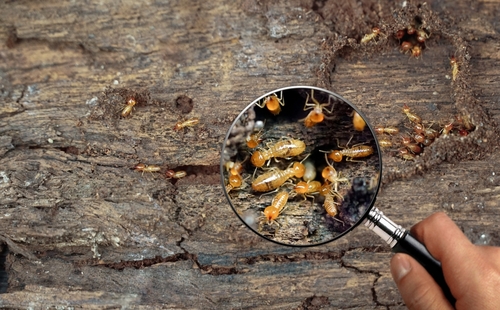
The Lifecycle of Termites: Understanding the Enemy
November 24, 2023Termite Control for Singaporean Restaurants and Cafes

Termite Control for Singaporean Restaurants and Cafes
Termite Control for Singaporean Restaurants and Cafes. In the bustling culinary world of Singapore, where restaurants and cafes offer diverse cuisines and unique experiences, an often overlooked menace lurks in the background – termites.
This comprehensive guide emphasizes the paramount importance of termite control in the food service industry, shedding light on the significant risks termites pose to these beloved establishments.
Read on – Termite Control for Singaporean Restaurants and Cafes:
The Unique Challenges Faced by Food Businesses
Wooden Infrastructure
Restaurants and cafes often exude a warm, inviting atmosphere with wooden furniture and decor.
However, this very charm can attract termites, presenting a distinct challenge to these businesses.
The choice of wood, while enhancing the ambiance, can inadvertently become an invitation for termites to dine alongside your customers.
Wooden beams, flooring, and furniture allow these pests to infiltrate your establishment.
Food Attraction
Termites aren’t merely interested in structural wood; they can also target food sources, intensifying the threat food establishments face.
Beyond their affinity for structural wood, termites are also drawn to the delectable offerings found in your restaurant or cafe.
From stored grains to wooden utensils, termites can infest and contaminate your supplies, posing a dual threat that demands immediate attention.
Customer Impact
Termite infestations can directly affect the dining experience of your customers. Unsightly damage and potential health hazards can deter patrons and tarnish your reputation.
Imagine a scenario where a customer discovers termite-damaged furniture or, worse, encounters a plate of food contaminated by termites.
Such incidents can lead to negative reviews, loss of clientele, and a damaged reputation that may take years to rebuild.
Understanding the Termite Threat
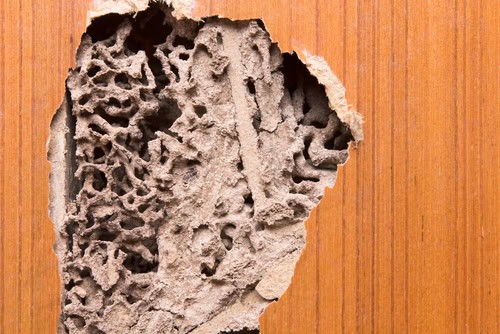
Termite Species in Singapore
Singapore is home to several termite species, with subterranean termites being the most prevalent. Understanding these species is essential for effective termite control.
The subterranean termite, often found in Singapore, builds underground colonies and forages for wood above ground.
Drywood termites are less common but can infest dry wood structures directly.
Signs of Termite Infestation
Early detection is crucial. Look for signs such as discarded wings, mud tubes along walls, and wood that sounds hollow when tapped.
Detecting termite infestations early is paramount to mitigating damage. Keep an eye out for discarded wings around windowsills or near light fixtures.
Additionally, mud tubes along walls or in corners can be telltale signs of termite presence.
If wooden surfaces in your establishment sound hollow when tapped, it’s a potential indicator of infestation.
Impact on Wooden Structures
Termites can burrow through wooden structures, compromising their strength. This not only jeopardizes the integrity of the building but also results in costly repairs.
The structural damage caused by termites can range from cosmetic issues to severe weakening of support beams and foundations.
The financial implications of repairing such damage can be substantial, not to mention the operational disruptions it may cause.
The Potential Consequences of Termite Infestations
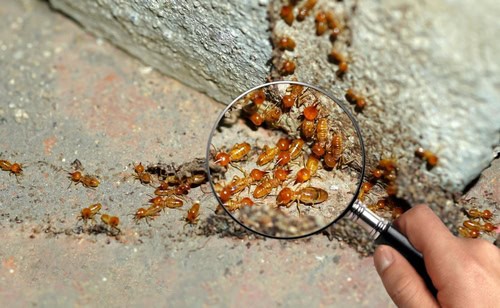
Structural Damage
Termites can inflict extensive damage on wooden structures, potentially leading to structural failures that require significant and expensive repairs.
The structural damage caused by termites can lead to costly renovations and downtime for your establishment.
Walls, floors, and ceilings may all be affected, necessitating extensive repairs to ensure the safety and comfort of your customers.
Health Hazards
Termites aren’t just destructive; they can introduce health hazards. Their presence in food establishments can contaminate food, posing risks to staff and customers.
Beyond structural concerns, termite infestations in food service establishments can lead to health and safety risks.
Contaminated food, compromised sanitation, and potential allergic reactions to termite presence are all serious concerns that demand immediate action.
Financial and Reputation Risks
Termite infestations can result in financial losses and damage your restaurant or cafe’s reputation. Negative publicity can be challenging to overcome in a competitive industry.
The financial implications extend beyond repair costs, including lost revenue due to downtime and potential legal issues.
Moreover, a tarnished reputation can drive customers away, further impacting your bottom line.
Preventative Measures for Termite Control
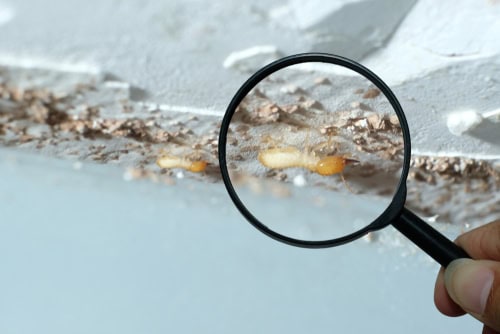
Regular Inspections
Frequent termite inspections serve as your first line of defense. Schedule professional inspections and perform regular checks to detect infestations early.
Implementing a regular inspection schedule is vital for early detection and mitigation.
Engage professional pest control services to conduct thorough inspections and complement these with in-house checks to ensure comprehensive coverage.
Building Materials and Construction
Termite-Resistant Building Materials
Opt for inherently termite-resistant building materials, such as concrete and steel. Incorporate these materials into your establishment’s design.
When constructing or renovating your restaurant or cafe, prioritize termite-resistant materials.
Concrete and steel structures, instead of wood, can significantly reduce the risk of termite infestation.
Proper Ventilation and Moisture Control
Good ventilation and moisture control can make your premises less appealing to termites. Ensure proper airflow and promptly address any leaks.
Proper ventilation helps maintain dry conditions less conducive to termite activity.
Addressing leaks and maintaining good drainage are essential steps to reduce moisture levels, and discourage termites from infesting your establishment.
Food Storage and Handling Practices
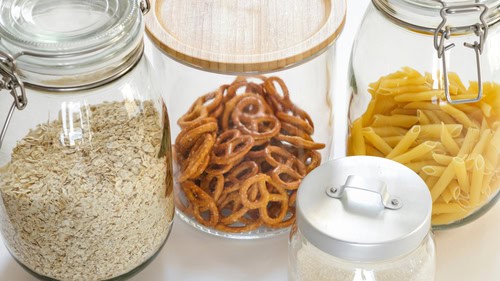
Air-Tight Food Containers
Store food in airtight containers to prevent termites from accessing it. Regularly inspect storage areas for signs of infestation.
Implement strict food storage practices to protect your supplies from termite infestations.
Use airtight containers to seal food items and regularly inspect storage areas for any signs of termite activity.
Maintain a high standard of cleanliness and sanitation in your kitchen and storage areas. This not only deters termites but also ensures food safety.
Regular Cleaning and Sanitization
Regular cleaning and sanitization are fundamental to a hygienic environment that discourages termite infestations.
Keep food preparation areas spotless and promptly address any spillage or crumbs that may attract termites.
Waste Management
Effective waste management is crucial. Regularly dispose of waste and maintain clean disposal areas to reduce the presence of food sources for termites.
Implement a robust waste management system to prevent food waste from accumulating and attracting termites.
Regular disposal and maintaining clean waste storage areas are essential for termite prevention.
Collaborating with Pest Control Services
Regular pest control services are a cornerstone of termite prevention. Professionals can tailor treatments to your establishment’s needs, ensuring comprehensive protection.
Establish a collaborative partnership with pest control services specializing in termite prevention.
Regular inspections, treatments, and customized strategies are essential to an effective termite control plan.
Legal and Regulatory Aspects
Legal Considerations and Compliance
Familiarize yourself with Singapore’s legal responsibilities regarding termite control in food establishments. Compliance is essential to avoid legal complications.
Ensure your restaurant or cafe complies with all relevant regulations and guidelines related to termite control.
This safeguards your establishment and demonstrates your commitment to customer safety and satisfaction.
Budget Considerations
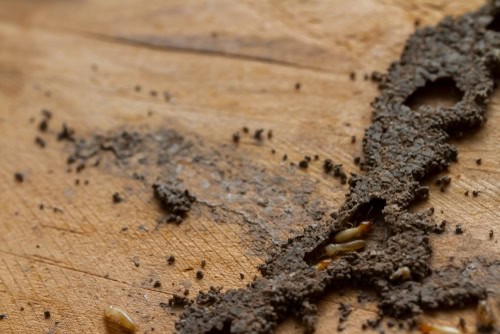
Cost Implications of Termite Prevention and Control
Investing in termite prevention is a proactive measure that can save you substantial costs in the long run.
The expense varies based on your establishment’s size and chosen prevention methods.
While termite prevention does come with associated costs, it’s a sound investment that can ultimately save you money.
Consider it an insurance policy against termite infestations’ potentially devastating financial repercussions.
Budget-Friendly Termite Control Solutions
Budget-friendly termite control solutions for cost-conscious restaurant and cafe owners include regular inspections, proper construction, and adherence to food safety protocols.
These measures significantly reduce the risk of infestations without straining your finances.
Balancing cost-effectiveness with comprehensive termite control is achievable.
Prioritize regular inspections and preventive measures to minimize expenses while safeguarding your establishment.
Frequently Asked Questions (FAQs)
How often should a restaurant or cafe undergo termite inspections?
Routine inspections should be conducted quarterly to ensure early detection and prevent termite infestations from taking hold.
Regular quarterly inspections are the industry standard. However, consider more frequent inspections if your location or circumstances warrant it.
What should I do if I discover termites in my food establishment?
Contact a professional pest control service immediately if you suspect or discover termites. They will assess the extent of the infestation and implement appropriate measures.
Prompt action is essential when termites are detected. Professional pest control services can tailor solutions to your specific situation, ensuring effective termite eradication.
Can termites affect the safety of the food served?
Yes, termites can pose health hazards by contaminating food. Preventive measures, including proper storage and sanitation, are essential to safeguard food safety.
Ensuring the safety of the food you serve is of utmost importance. Implement stringent food safety practices to protect against termite contamination or other pests.
Termite Control for Singaporean Restaurants and Cafes – Conclusion

In conclusion, termite control is not a choice but a necessity for restaurant and cafe owners in Singapore.
The risks termites pose to your establishment’s infrastructure, finances, and reputation are too great to ignore.
By understanding the termite threat, implementing preventative measures, and collaborating with pest control professionals, you can protect your business, customers, and your hard-earned reputation.
Make termite control a priority to ensure your food establishment’s continued success and safety in Singapore.
Are you seeking professional and reliable termite control services in Singapore? Contact us today!




